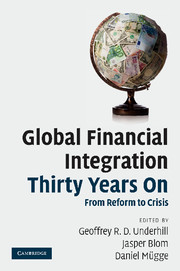Book contents
- Frontmatter
- Contents
- List of figures
- List of tables
- Notes on contributors
- Preface
- Acknowledgements
- List of abbreviations
- Introduction: the challenges and prospects of global financial integration
- Part I History and context: input, output and the current architecture (whence it came)
- Part II Assessing the current financial architecture (how well does it work?)
- 5 Adopting international financial standards in Asia: convergence or divergence in the global political economy?
- 6 The political economy of Basel II in the international financial architecture
- 7 The catalytic approach to debt workout in practice: coordination failure between the IMF, the Paris Club and official creditors
- 8 Empirical evidence on the new international aid architecture
- 9 Who governs and why? The making of a global anti-money laundering regime
- 10 Brazil and Argentina in the global financial system: contrasting approaches to development and foreign debt
- 11 Global markets, national alliances and financial transformations in East Asia
- Part III Does the future hold? Reactions to the current regime and prospects for progress (where is it going?)
- Conclusion: whither global financial governance after the crisis?
- References
- Index
6 - The political economy of Basel II in the international financial architecture
Published online by Cambridge University Press: 02 December 2010
- Frontmatter
- Contents
- List of figures
- List of tables
- Notes on contributors
- Preface
- Acknowledgements
- List of abbreviations
- Introduction: the challenges and prospects of global financial integration
- Part I History and context: input, output and the current architecture (whence it came)
- Part II Assessing the current financial architecture (how well does it work?)
- 5 Adopting international financial standards in Asia: convergence or divergence in the global political economy?
- 6 The political economy of Basel II in the international financial architecture
- 7 The catalytic approach to debt workout in practice: coordination failure between the IMF, the Paris Club and official creditors
- 8 Empirical evidence on the new international aid architecture
- 9 Who governs and why? The making of a global anti-money laundering regime
- 10 Brazil and Argentina in the global financial system: contrasting approaches to development and foreign debt
- 11 Global markets, national alliances and financial transformations in East Asia
- Part III Does the future hold? Reactions to the current regime and prospects for progress (where is it going?)
- Conclusion: whither global financial governance after the crisis?
- References
- Index
Summary
Introduction
The new Basel capital accord (B-II) promulgated by the Basel Committee on Banking Supervision (BC) was intended as a centrepiece of the financial architecture reforms that followed the crises of the 1990s (for the broader context, see Part I of this volume). B-II established a new approach to measuring capital adequacy of internationally active banks in a context of consolidated supervision of increased cross-border banking activities. Its impact will be felt well beyond the BC's G10-member financial institutions. In addition, the BC continues to set a broad range of global standards for financial regulation and prudential supervision. While B-II is ostensibly, in part at least, about creating a more level playing field among internationally active banks, this chapter provides evidence that the impact of B-II will be far from neutral on competition among different types of banks and, crucially, on the cost and availability of capital for developing countries. Furthermore, we demonstrate how B-II's inherent pro-cyclicality has an especially large impact on developing countries. Combined with B-II's reliance on rating agencies, biases against small and medium enterprises, and high costs of implementation for developing countries (see also chapter by Ocampo and Griffith-Jones in this volume), its potentially distorted impact on competition and pro-cyclicality considerably hampers B-II's effectiveness as a global supervisory standard to provide financial stability. Arguably, B-II and the market-based approach to financial supervision which the BC promoted from the 1996 Market Risk Amendment to B-I were central factors behind the emergence of the global financial crisis.
- Type
- Chapter
- Information
- Global Financial Integration Thirty Years OnFrom Reform to Crisis, pp. 113 - 133Publisher: Cambridge University PressPrint publication year: 2010
- 5
- Cited by



